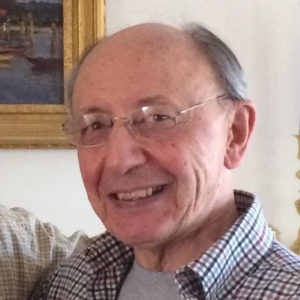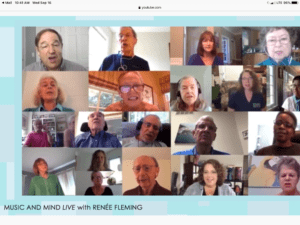Webinar event hosted by renowned soprano Renee Fleming
By Melanie Petrucci, Senior Community Reporter

Photo/submitted
Shrewsbury – David Lucht is missing his chorus. Lucht is a member of the Parkinson’s Chorus of Central Massachusetts, that is based in Shrewsbury but has members from nearby communities. Like so many other organizations, they have been unable to meet due to the coronavirus pandemic.
“I miss the singing…my voice is a little messed up,” explained Lucht.
Lucht, 77 is a retired Worcester Polytechnic Institute WPI professor who was diagnosed with Parkinson’s disease about 10 years ago. He has found that singing has been extremely beneficial for his voice because it helps him with breath control and volume. These can become impaired with Parkinson’s disease.
Recently, however, he had an opportunity to appear with 170 performers who also have Parkinson’s disease in a special webinar event. The performers, who hailed from the U.S. and Australia, sang solos that were then blended electronically into one virtual chorus performing one song – “What the World Needs Now is Love,” made popular by Dionne Warwick in 1965 and composed by Burt Bacharach with lyrics by Hal David.
This special performance was part of the Sept. 8 webinar from the “Music and the Mind Series” hosted by renowned soprano and arts and health advocate Renee Fleming through the Kennedy Center for the Performing Arts in Washington, D.C. The online series features Fleming’s conversations with scientists and practitioners “working at the intersection of music, neuroscience, and healthcare.”

Photo/ Courtesy of Music and the Mind webinar
The Sept. 8 episode focused on Parkinson’s disease; particularly the use of music as therapy.
Elizabeth Stegemoller, professor of human sciences at Iowa State University and leader in Parkinson’s research, was on the panel of speakers.
“Stegemoller has a special program in voice for Parkinson’s patients,” Lucht commented.
Stegemoller’s research has found that singing improves breath control and swallowing which are often areas of difficulty for those afflicted with the disease. She reached out to the Massachusetts chapter of the American Parkinson’s Disease Association who contacted the Parkinson’s Chorus of Central Massachusetts to invite them to participate.
“The chorus was offered the opportunity to do this, but I was the only one who signed up and had the courage to do it,” Lucht added. “If my mother was alive, she would never believe that I did a solo.”
While the chorus is still on hiatus because of the pandemic, Lucht is looking forward to the members getting back together soon.
Lucht encourages anyone with Parkinson’s to participate. No prior singing experience is required. Caregivers and care partners are welcome to come and sing too.
“We miss the singing and we miss the camaraderie; we value most the camaraderie,” he noted. “People get together every week, talk about their problems and sing. It was really important to us to have that feeling of belonging to the group.”
“Many people don’t know about us…it’s easy to get stuck at home with Parkinson’s. It’s hard to walk and it’s hard to talk and communicate,” he said. “The chorus is great because people can sing together, and it uplifts your spirit in addition to your voice.”
The chorus typically meets on Mondays at 10:30 a.m. to 12 p.m. at the First Congregational Church, 19 Church Rd. and the cost is free. For more information, email David Russell, chorus facilitator at [email protected].
The September 8 “Music and the Mind Series” webinar episode is on YouTube and can be accessed by clicking on the link: https://youtu.be/-T1Wy_j5N1E.

















